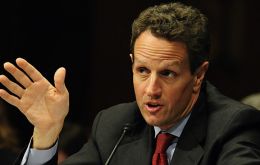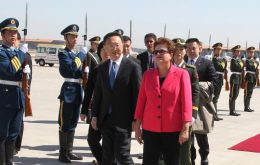MercoPress. South Atlantic News Agency
Tag: Yuan
-
Tuesday, May 17th 2011 - 23:31 UTC
US dollar status as world’s single reserve currency will end by 2025

The United States dollar status as the world’s single reserve currency will end by 2025, according to a new report by the World Bank.
-
Monday, May 16th 2011 - 03:01 UTC
China again hikes banks reserves requirements, fifth time this year

In an attempt to cool inflation China’s Central bank raised banks’ reserve requirements for the fifth time this year. The half-point increase takes effect May 18 and will boost levels for China’s biggest lenders to a record 21%.
-
Tuesday, May 10th 2011 - 21:27 UTC
Beijing promises a more flexible Yuan exchange rate, says US Treasury

China assured the United States that it will continue moving toward a more flexible Yuan exchange rate, a US Treasury official said on Tuesday. The announcement came as the Central bank set the Yuan reference rate at the strongest level since 2005.
-
Monday, May 2nd 2011 - 00:21 UTC
China’s manufacturing slows down in April, according to official data

China's manufacturing growth slowed in April, according to official figures. The country's purchasing managers' index (PMI), which is designed to provide a snapshot of conditions in the manufacturing sector, fell to 52.9 in April, from 53.4 in March.
-
Saturday, April 30th 2011 - 09:48 UTC
To help contain inflation, China allows appreciation of the Yuan

China's currency, the Yuan, strengthened past a key level against the US dollar on Friday, as part of wider efforts to contain inflation on the mainland. The Yuan broke past 6.50 against the dollar, a level not seen since 1993.
-
Tuesday, April 19th 2011 - 14:04 UTC
IMF pounds at emerging and developed countries, but forgets self-criticism

The IMF criticized developing countries for not responding strongly enough to the surge of hot money into their markets, saying the result could be a hard economic landing.
-
Monday, April 18th 2011 - 07:10 UTC
China’s anti-inflation crusade raises bank reserves: fourth time in four months

China raised banks' required reserves for the fourth time this year, extending the fight against excessive liquidity and stubbornly high inflation in the world's second-largest economy.
-
Friday, April 15th 2011 - 18:50 UTC
China’s 3 trillion USD reserves intensify debate on Yuan convertibility

China's foreign exchange reserves exceeded the mark of 3 trillion US dollars for the first time at the end of March 2011, representing an increase of 24% from a year earlier. China retains the world’s leading position in forex reserves, according to data released by the country’s central bank.
-
Thursday, April 14th 2011 - 19:54 UTC
BRICS calls for new global monetary system with less reliance on the dollar

The BRICS group of emerging-market powers kept up the pressure for a revamped global monetary system that relies less on the US dollar and for a louder voice in international financial institutions.
-
Monday, April 11th 2011 - 21:09 UTC
Brazil aware its relation with China raises the risk of “Dutch Disease”

President Rousseff arrived in Beijing Monday to begin a state visit to China that will incorporate Thursday’s summit of BRIC leaders. However Ms Rousseff’s trip to China is symbolically important since it is her first overseas visit outside Latin America and underlines the growing importance of the Brazil/China relationship, points out Capital Economics.
